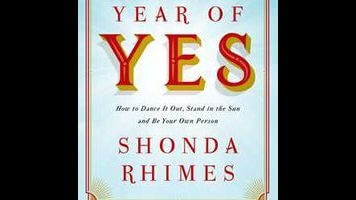Shonda Rhimes’ Year Of Yes is for devout Shondaland fans only

By all accounts, Shonda Rhimes is an impressive, amazingly successful person. She is a showrunner who has cornered her own entire evening on ABC’s Thursday nights, running three shows that feature strong women in the leads. Kerry Washington and Viola Davis are heading the first dramas starring women of color since 1974’s Get Christie Love. Davis has already won an Emmy for her efforts. Rhimes cites herself as an “F.O.D.,” a “first, only, different person” who has blazed a new trail for women of color in television production.
What Rhimes crafts are entire worlds—a hospital, a private practice, a political consultant firm—full of drama and intrigue and not a little romance. It’s not for nothing that her logo is a giant heart surrounded by a roller coaster, in a world she calls Shondaland. In her first memoir, Rhimes reveals that she started creating Shondalands as a child, as the youngest of six children in Park Forest, Illinois, where she used the cans in her mother’s cupboards to create her own worlds that would be the precursors of Grey Sloan Hospital and Olivia Pope & Associates.
If you watch any of Rhimes’ shows, you know that her characters have a certain way of speaking, which is indicative on any of her many series. There are monologues. There are diatribes. There is a lot of clunky repetition, and lists that almost have audible bullet points. Not that you would have any question on where these verbal quirks come from, but you would have even less so after reading Rhimes’ new book, which basically is a 280-page Meredith Grey monologue. Repetition, some off-topic leaping, some efforts to wrangle everything back to the subject matter at hand: This is Rhimes’ language. This is how she operates. Only in this memoir, she’s working without the buffer of other writers in her writers’ room, and seemingly without a very strong-handed editor, because this is the Shonda show:
This is who I am.
Silent.
